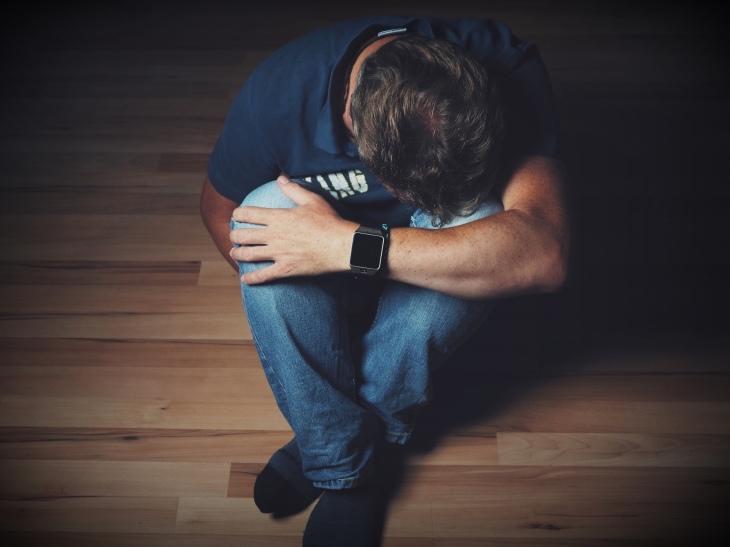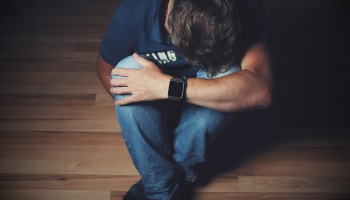
Have you ever tried cheering yourself up with comfort foods or a shopping spree when you’re feeling blue or having a bad day? Or, have you ever smoked a cigarette, or visited the bar for a drink or two with hopes of calming your nerves and lifting your mood? Engaging in behaviors such as these from time to time can provide a much-needed escape and mood boost during unexpected moments of stress, sadness, or depression, even if just for a short time.
But if you find yourself starting to practice these behaviors regularly and repeatedly, it’s possible you might be using addiction to cope with the underlying depression. Or, perhaps you’ve already been suffering from drug or alcohol use disorders, and have noticed the onset of depression, or worsened depression symptoms. In any case, there’s a real link between depression and addiction, since each disorder has been found to increase the presence of the other.
Depression and addiction are two mental health disorders that can feed off one another due to the way each of these conditions affect the brain. Those who suffer from depression may frequently turn to drugs and alcohol to mask their symptoms, and to elevate their moods. At the same time, those who suffer from addiction are generally more predisposed to mood disorders like depression, due to the way alcohol and drugs alter brain chemistry.
So, which comes first, and which condition is more likely to trigger the other — depression, or addiction? Does suffering from one condition mean that the onset of the other condition is inevitable and unavoidable?
Here’s a breakdown of the shocking link between drug addiction and depression.
Examining Mental Health in the United States
Depression and addiction affect a significant portion of Americans. Data shows that roughly 6.7 percent of American adults experience at least one major depressive episode per year, while 6.6 percent of Americans suffer substance use disorders and are physically dependent on drugs and alcohol.
Americans who are diagnosed with anxiety and mood disorders like depression are nearly twice as likely to also suffer drug use disorders than those without mental illnesses. The existence of two disorders or illnesses in the same person is known as a comorbidity. Addiction and the presence of another mental health disorder is also commonly known as dual diagnosis, or co-occurring disorder.
Gender has been shown to play a major role in co-occurring disorders involving mood disorders and addiction. Men are more likely to suffer antisocial personality disorder, while women are more likely to suffer both anxiety and mood disorders. Anxiety disorders are the most common mental health disorders in the U.S., and affect 18.1 percent of the population every year. But any mood or anxiety disorder, regardless of a person’s gender, is a known risk factor for substance abuse and drug use disorders.
Depression and the Opioid Crisis
Opioids, or painkillers, are often prescribed to treat moderate to severe pain. In the U.S., opioid abuse and addiction has become a serious public health crisis. In 2015, more than 33,000 Americans died from an opioid overdose, and more than two million people were reported to suffer from substance use disorders related to painkillers.
Pain is a common symptom of depression, and can cause discomfort in the form of chronic joint pain, back pain, limb pain, and related symptoms of fatigue, insomnia, and changes in appetite. Many researchers believe that the U.S. opioid epidemic is being driven in part by depression, since some with depression tend to feel more comfortable and less like failures when admitting to suffering pain versus depression. Though depression is widely recognized as a treatable mental health condition, some patients fear stigma surrounding their disorder, and cite pain as their reason for needing pain treatment.
Opioids produce euphoric effects and offer sedative properties that can put those who suffer depression at ease. But given the highly addictive nature of opioids, people can quickly become dependent on these drugs within a short period of time. Also, opioids are not generally approved for use in treating depression, and can actually worsen symptoms of depression such as an increased risk for suicide.
A recent study found that patients who suffered low back pain and depression were highly likely to be prescribed high doses of opioids by their doctors. The study authors noted that those with depression are more likely to misuse and overdose on opioids than those not diagnosed with depression. Another study found that more than half of all opioid prescriptions in the U.S. are written out to those who also suffer depression and other mental health disorders.
How Depression and Addiction Affect the Brain
Depression and addiction are both shown to have an impact on the brain’s dopamine balance. Dopamine is a naturally occurring brain chemical involved in the brain’s reward system, and is also essential to movement, motivation, and to the way a person perceives reality. Dopamine imbalance has been linked to drug use disorders and psychosis, which is characterized by hallucinations and delusional thoughts. For instance, some studies show that marijuana use increases the risk for psychosis in some individuals.
Alcohol, opioids, and all other drugs either interfere with or bind to receptors in the brain that increase dopamine production. This flood of dopamine is what makes people feel happy or “rewarded” when using drugs and alcohol. Those who get hooked on intense feelings of reward and euphoria will turn to drugs regularly to achieve these effects.
Over time and with regular use, a person can become tolerant to drugs and alcohol and require higher amounts to achieve the effects they’ve grown used to. Tolerance can lead to physical dependence, which is when a person experiences withdrawal symptoms upon ceasing or reducing drug use. When someone becomes physically dependent on drugs and alcohol, their brain stops producing dopamine on its own, and starts relying on substances for happiness and reward. Science shows that prolonged exposure to high dopamine levels can trigger depression.
Drugs most commonly linked to mental health disorders are:
- Marijuana
- Cocaine
- Methamphetamine
- Prescription stimulants (e.g., Adderall, Ritalin)
- MDMA, or ecstasy
- LSD, or acid
- Inhalants
- PCP
- Kratom
- Ketamine
- Steroids
Evidence shows that the existence of drug use disorders and mental illnesses at the same time are generally caused by overlapping factors including genetic background, underlying brain deficits and early exposure to trauma or stress. For example, a person with both depression and addiction in their family history may be more predisposed to these mental health conditions than their counterparts. Research shows that between 40 and 60 percent of a person’s vulnerability to addiction can be attributed to their genetic background.
In cases where drug abuse exists before mental illness, evidence shows that drugs can alter brain chemistry in a way that makes the brain more prone to developing that particular mental illness. But when mental illness exists before drug abuse, the changes in brain chemistry brought on by the mental illness can enhance the positive effects of drugs, while reducing that person’s awareness of the negative effects of drug use. Additionally, some drugs have the ability to reduce many unpleasant symptoms associated with depression and other mental health disorders.
Which Comes First, Depression or Addiction?
Considering how drug addiction and depression both affect the brain in similar ways, there is no causal relationship between the two mental health conditions — especially when depression and addiction affect people in different ways, for different reasons. Depression does not always come before addiction, or vice versa.
Certain drug use disorders are known to trigger symptoms of depression in some users. For instance, alcohol use disorder can cause feelings of sadness, hopelessness, and lethargy. On the other hand, depression can also lead to drug abuse, since individuals who suffer depression frequently turn to drugs and alcohol to self-medicate and reduce their symptoms.
When depression comes first, some drug users tend to choose substances that specifically treat their most problematic symptoms. For instance, a depressed individual struggling with severe fatigue and lack of concentration may abuse prescription stimulants to boost their energy and focus. On the other hand, a depressed individual suffering restlessness and anxiety may turn to opioids or benzodiazepines to help them relax.
When addiction comes first, a person’s drug use can awaken or trigger the onset of depression — especially in instances where mental illness is part of family history. Some drugs even disrupt brain chemistry gradually over time to increase the risk for depression later on.
Data shows that a person who suffers from only depression or addiction is often more susceptible to the other condition by default. Depression increases the risk for addiction, and addiction increases the risk for depression.
Fortunately, drug addiction and depression can be effectively managed and treated using a combination of detox, behavioral therapy, counseling, and other therapies that treat underlying causes of both disorders.
Getting Treatment for Co-Occurring Disorders
Those who suffer co-occurring disorders often go through drug detox first before starting psychological therapy for depression and addiction. Drug detox helps patients overcome physical dependency on drugs and alcohol, and allows them to withdraw from these substances safely with a lowered risk for relapse, overdose, and other health complications. Detox improves one’s physical and mental health so the person can move on to being treated for depression and root causes of addiction.
Addiction is commonly treated using cognitive-behavioral therapy or CBT, which helps patients identify triggers and negative thoughts and behaviors driving their drug use. CBT teaches patients healthier ways to deal with stressors and other situations without relying on drugs and alcohol. For instance, someone with depression who uses drugs as a way to overcome loss of interest can learn to modify their thinking and discover new, healthier interests to replace drug use.
Other therapies commonly used to treat addiction include 12-step support groups like Alcoholics Anonymous and Narcotics Anonymous, and individual and group counseling. Depression is treated using similar therapies as addiction, since both disorders are mental illnesses. Depression may be treated using CBT, behavioral therapy, and psychotherapy, and may also involve the use of antidepressants and other medications that treat depression.
Long-term therapy and aftercare programs are essential to helping patients stay healthy and drug-free following treatment. Aftercare allows patients to receive ongoing support-group therapy, counseling, and relapse prevention training in the months and years after overcoming drug dependence. Many addiction treatment centers also recommend that those who suffer co-occurring disorders opt for inpatient care, which offers intensive therapy in a safe, controlled environment for those who need help fighting addiction and depression at the same time.
It’s never too late to get help for depression and addiction — no matter what your age, gender, or socioeconomic status, or the severity level of one or both disorders.
Common signs of depression:
- Significant changes in weight
- Changes in appetite
- Feelings of hopelessness
- Feelings of helplessness
- Feelings of guilt or self-loathing
- Loss of interest in favorite activities
- Insomnia or oversleeping
- Fatigue and energy loss
- Restlessness
- Anger
- Irritability
- Problems with concentration
- Reckless behavior
- Physical aches and pains
Common signs of addiction:
- Changes in weight
- Changes in appetite
- Loss of interest in favorite activities
- Insomnia or oversleeping
- Problems at work or school
- Financial problems
- Relationship problems
- Hiding drug use from others
- Lying about drug use
- Irritability
- Anxiety
- Depression
- Cravings for drugs and alcohol
- Drug and alcohol withdrawal symptoms
Since some signs of depression and addiction overlap, it’s important to seek help immediately if you’re not sure whether you’re suffering depression, addiction, or both. Getting treatment for co-occurring disorders can help you take back control of your life, and learn necessary skills for managing depression and staying addiction-free.

